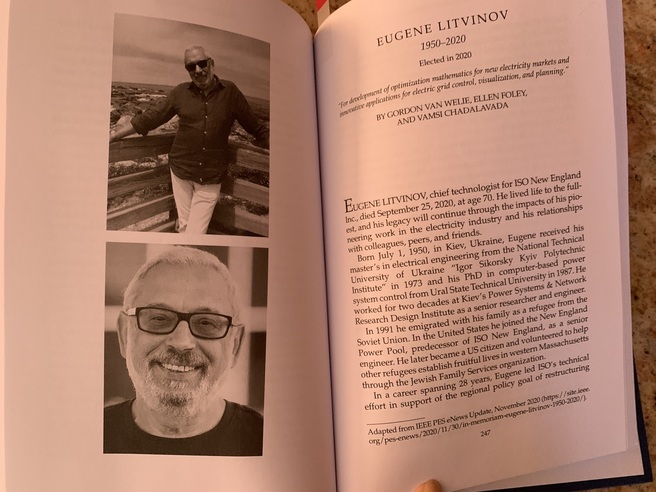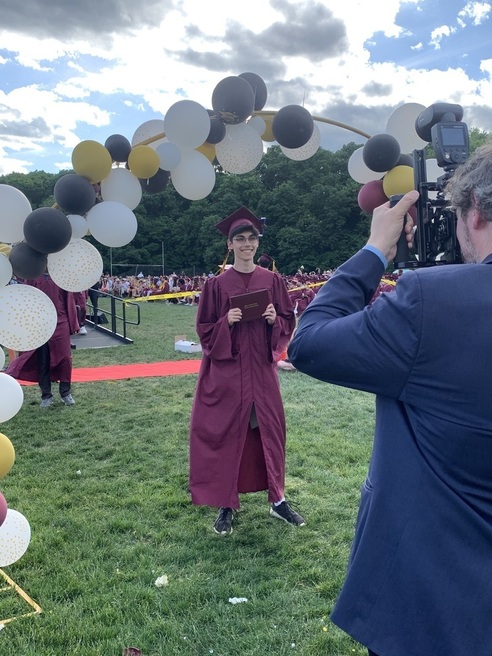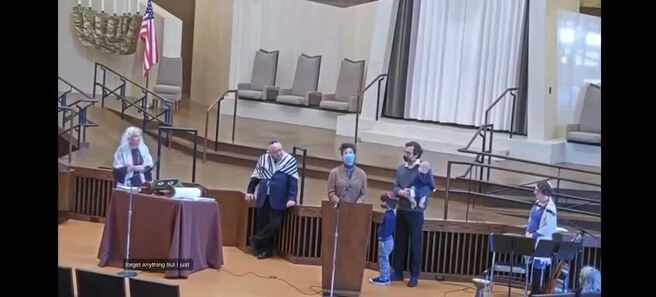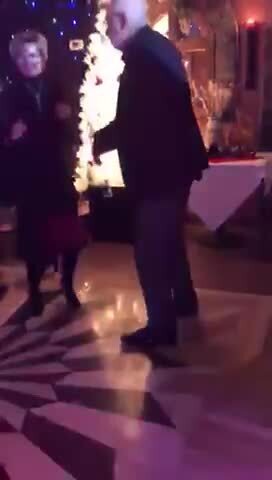It took me a long time to decide whether or not I will even be able to speak today, but here I am and I hope not to get too emotional speaking about Eugene.
First of all, I would like to thank you for dedicating this panel to Eugene. It means a lot to me and our family. It warmed my heart to know that so many people remember him, his work and his contributions to the industry, to academia and to science.
I also would like to extend my gratitude to so many of you who came to his funeral at the time of covid, and who wrote on Eugene’s Forever missed website, which was created by his team right after his death. Thank you for your letters and cards, and thank you to everyone who reached out to me with kind words about him as a human, colleague and friend. Thank you for all your support and kindness, from the entire family and from me personally.
He left us so unexpectedly, so brutally and so untimely, that I am still struggling to understand it. I am struggling to accept why it happened the way it happened, and why my brilliant, vibrant , active, so full of life man was taken from us all. He could have lived so much longer and done so much more..
Many of you will speak today about his professional life and his contributions to the industry and academia, but I would like to tell you more about him as a person, husband, father, grandfather and friend.
Eugene was born and grew up in Kiev, in famously antisemitic Ukraine, in the former USSR, to an average jewish family. He was a very active little boy, mischievous, very bright, and very well-loved by his parents, grandparents, his brother and his friends. He was a very good student in school, but he also was known as a notorious hooligan, the beginning of a long career of troublemaking. He often recalled how he would put Beatles records on the school radio and got in so much troubles because of it, since of cause the Beatles were forbidden in the country we came from.
As a jewish boy, he faced his share of discrimination, humiliation and degrading treatment, which only worsened as he got older. He grew up knowing that he had to work harder, and to be better than most, in order to achieve what he wanted in life.
His favorite subjects in school were mathematics and Russian language and literature. But he also had a limitless curiosity about almost everything, which he carried throughout his life, which gave him an encyclopedic knowledge about many subjects he was interested in. All his life he was a phenomenal reader and book collector. We had a huge home library in Kiev, even though good books were not easy to come by in the Soviet Union. And we have a huge book library here too, with an eclectic collection of science fiction, art books, professional books, and of cause, novels.
He came to this country as a refugee with hardly more than the clothes on his back and his wits --thankfully considerable-- and he made a life for himself and his family that he could only dare imagine where he came from. His only regret was that he did not come here at least 10 years earlier, but then he would not have met me..
He started his career with what’s now known as ISO NE in 1992 as an engineer and became -- as many of you mentioned in your posts and letters to me -- a “ true giant” in industry. You will talk about his achievements and contributions today, but I just wanted to mention that his brightest ideas and their solutions often came to him at night. They often came in his dreams, and he would wake up so excited in the morning trying to explain them to me, impatient to start working on them immediately. He loved mathematics for its elegance and its ability to bring his ideas to life, and he truly appreciated its beauty. His ideas were not always recognized at the time, but he always knew what would and what would not work in real life 5-10 years after. In this sense he was a visionary.
I was always amazed at his ability to generate new ideas, which were limitless. He was a generous man in everything, so he did not mind when people used his ideas as their own, even if it rubbed him the wrong way sometimes.
He never cared much about his titles , never bragged about his achievements , so that very few people outside of his closest family knew about them. He knew his worth and it was enough for him. But he was truly happy when he was recognized by the National Academy of Sciences and Engineering, just last year, especially because he had no idea whatsoever it might happen.
It is a tragedy that he did not live to serve there. As his daughter Sasha said during her beautiful eulogy, he would have inevitably turned the whole institution and, she had hoped, all of academia, upside-down. He was, on paper, a Power Systems Engineer. But we all know that title doesn’t even begin to tell his story. I think he could have engineered a whole new world, Sasha said, and in a way he did. “
Not only did he have a sharp mind and extensive knowledge, but he also had the courage of his convictions and the strength to stand for reason, in a world where reason is so often an afterthought, if not a downright nuisance. He had the fortitude, not only intellectually but spiritually, to see things differently.
He never cared much about in-house politics, and he always judged and promoted people by their merits and their human qualities, not anything else.
Eugene had a way of looking at ordinary things and making you see something extraordinary.
The same was true of how he looked at people.
He was easy to befriend, and he charmed everyone he didn't totally intimidate. He loved to be in “compania,” in the company of friends, and he knew how to have a good time and make sure everyone around him lit up like a spark. He savoured life, he knew how fleeting and how strange and unfair life could be, and so he filled every moment with his mishpuchah and his compania with the breath of life and laughter.
Anyone who ever met him would tell you that he radiated warmth and kindness. His eyes twinkled with humor and humanity. He told the most extraordinary stories, the most improbable jokes, gave the most useful of life lessons. He always loved that he was known as a practical joker, but he will also be remembered as a force to be reckoned with.
He also cherished the many friendships he had, but most of all his lifelong friends, who are now scattered around the globe and whom we met many times over the years in different countries. We were going to be in Monte Negro in summer of 2020 to celebrate his 70th anniversary, but covid happened and we spent 2 hours on Skype instead.
A little bit about us now.. We started our romance, our love story in 1986, the year of the Chernobyl disaster as you probably know. We loved each other deeply, unconditionally and unquestionably ever since, which was the envy of many.. Eugene would often say how lucky we were to find each other, to love each other, and to have a very joyful life together. He would often repeat how rare and precious it is. Our house has been a house full of joy, laughter, family and friends.
Of course as he often said, he wasn’t a perfect husband, as he couldn’t do much around the house, and often joked, that I should have picked up a handier guy!
But I know we had a rare gift and my heart is forever broken. Half of me died that day too and sometimes its unbearably difficult even to breathe.
There is not a minute of my day when I don’t think about him, about what he would have done, or said. But I also know that he is with me, if not physically, but in spirit, and he would have wanted me to be strong for the family. I live surrounded by his books, his music, his art collection, his multiple gadgets and of course my memories.
Eugene and I shared a life rich in adventures and travels to many parts of the world. We never put anything on a back burner. Eugene’s favorite cities we visited were Venice and Prague. But his favorite trip of all, was to South America, Chili and Argentina, perhaps because he was so happy to see and experience all those places we read about in Jules Verne’s books as kids.
All his life he has never lost the ability or desire to learn something new, to see new places, to learn a new language, to experience new cultures, to read a new book, to try new foods, even if they might seem weird and scary to other. He has never lost the quality of a little boy, who enjoyed his toys. Of course the toys changed over the years, but he did not. He lived a full life and enjoyed the smallest things he found interesting.
Eugene loved and cherished his family, his children, grandchildren, his nieces, his brother, his whole family and me. Family has always been number one for him and he was an undeniable leader. He always served as a shoulder to cry on, to bring our problems, our questions, our doubts and uncertainties, but also our successes and joys. We could always rely on his careful and soft spoken advice and suggestions. He knew how to listen and to lift our spirits through the many storms we weathered together.
His children were his pride and joy. He was strict with them often, especially with Sasha, who was only 2 years old when we came to this country, but he was always fair. We did our best to give them the best education and opportunities and always respected their choices. We never tried to enforce what we thought was right for them, but let them choose and design their own future. The freedom to choose, which we never had growing up, has always been very important to us.
We raised a wonderful daughter together, Sasha. She was an apple of his eye, his favorite person with whom to discuss a new book, a new film, a new event, news in this country and around the world. They did not always agree with each other but tried very hard to understand and respect each others’ opinions. She is in so many ways so much like him and at the same time her own person, the one he called the smartest in the family, smart as a whip. The connections they shared, the closeness and love between them will stay with her and protect her forever.
Eugene’s kids grew up believing that as ugly as the world could be it didn’t matter; there was always another secret world just underneath the surface if you scratched a little: a world of beauty and adventure and wonder, and if they wanted it, something like freedom, that elusive and most precious thing.
He taught them to be strong but flexible, to be capable but patient, to hold themselves to their own standards and no one else's, except maybe his.
He taught them how to stand up for themselves, how to not take no for an answer, that no height is too high, or high enough. Never get complacent.Reach for the stars and don’t stop there. Be passionate about what you do and who you love. If there’s no passion, then what's the point?
He also was very fond of his team, the group he created at ISO-NE. He often spoke of them, especially the younger ones, as his “children”. I know he tried as with his children, to teach and help them not only professionally, but also with any other problems they sometimes had. I am sure that they will continue to make him proud.
Eugene was always ready to help in any way he could and he touched so many lives, helped so many people to become what they are now, without them even realizing it.
In our culture people like Eugene are called a mensch, a person of integrity and honor, kind and considerate.And he definitely was. He was also called one of the last “renaissance” men by our rabbi.
Eugene knew what was important in this life, so let’s all take one more lesson from him. That what gives you life in this life is for you to find the people that you love and you keep them close you. And you cherish them, and you marvel in them, and you live to make them happy. Surround yourself with people who you love and who fascinate you and laugh with them in the face of any darkness, and the darkness will turn to a speck of dust in the face of your love, and you will live a blessed life.
I know a lot of people count themselves lucky to have known him -his family, his friends, his students, his colleagues . He introduced us to and made us all gatekeepers of a world that was anything but pedestrian.A world with books that could transport you to another time and space, ideas that could enchant you, words that seemed like nonsense but felt more true and real than the regular ones.
We could stand here for hours listing all his achievements. Hours retelling his jokes and the impossible tongue twisters that he has made us recite, faster and faster each time. Because, he said, ***life is boring if there is no challenge. If there is no challenge, one must be invented immediately and immediately shared.
And so, true to form, he has presented us with his last and greatest challenge – how to live without him.
But like all of Eugene’s puzzles, this question of how we will go on without him is a trick question!
We will not be without him. He will be with us always.He left a deep footprint on this world before he left it. Let us remember him well, l’dor v’dor, from generation to generation, from now until forever.





